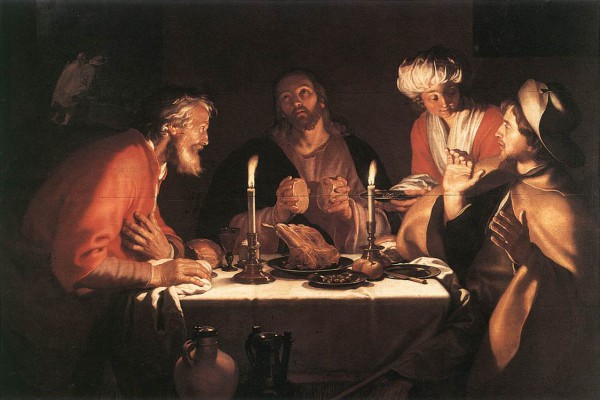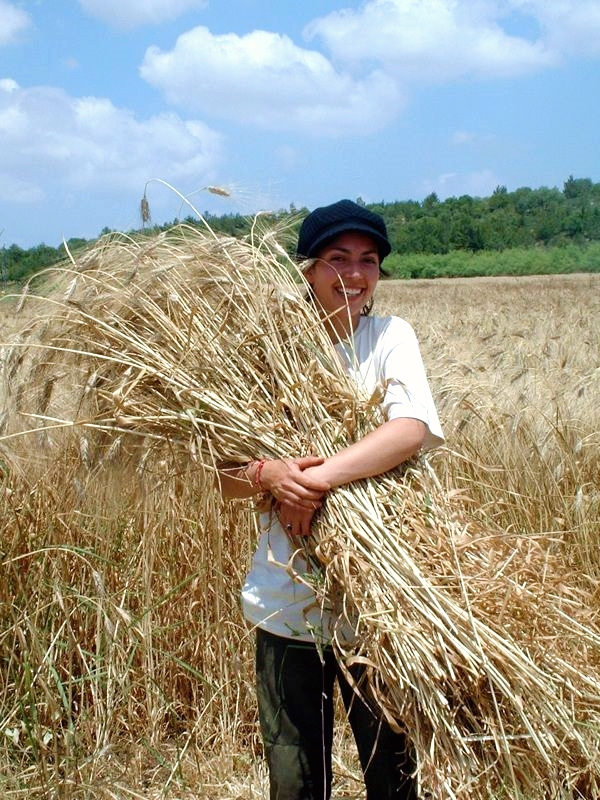
“For I know that my redeemer liveth, and that He shall stand at the latter day upon the earth: And . . . in my flesh shall I see God.” (Job 19:25–26)
When Yeshua (Jesus) died on the execution stake and became our Passover Lamb, that was not the end of Him!
Yes, He was cut off from the living for three days, but He rose from the dead and He is Alive!

Resurrection: An Orthodox Jewish Belief
Most Orthodox Rabbis believe that every Jew will be resurrected and experience spiritual life.
As is written in Kohelet (Ecclesiastes), “The dust returns to the ground it came from, and the spirit returns to God who gave it.” (Ecclesiastes 12:7)

The Ascension (1636), by Rembrandt. After appearing to multitudes of people over 40 days, the risen Yeshua (Jesus), “was taken up before their very eyes.” (Acts 1:9)
The New Testament Book of Hebrews describes the great men and women of faith. Some women received their dead back to life again, while “others were tortured and refused to be released, so that they might gain a better resurrection.” (Hebrews 11:35)
The Tanakh (Old Testament) also describes a resurrection from the dead and subsequent judgment. The Hebrew prophet Daniel gives an account of what will happen in the last days:
“Multitudes who sleep in the dust of the earth will awake: some to everlasting life, others to shame and everlasting contempt.” (Daniel 12:2; see also Isaiah 26:19 and Psalm 16:10)
And the first of those to awaken to everlasting life would be Messiah Yeshua.
Yeshua Explains His Resurrection
Some have argued that what was an apparent resurrection of Yeshua’s body had simply been a manufactured story by His disciples, who skeptics say tried to make His life fit into the many prophetic Scriptures about Messiah’s death and rising from the dead.
But, in fact, the disciples did not connect Yeshua with these prophecies until many days after He rose from the grave, even though Yeshua tried to prepare them when He said:
“We are going up to Jerusalem, and the Son of Man will be delivered over to the chief priests and the teachers of the law. They will condemn Him to death and will hand Him over to the Gentiles to be mocked and flogged and crucified. On the third day He will be raised to life!” (Matthew 20:18–19; see also Mark 8:31)
Yeshua also compared Himself with the prophet Jonah, saying, “For as Jonah was three days and three nights in the belly of a huge fish, so the Son of Man will be three days and three nights in the heart of the earth.” (Matthew 12:40)
In Luke’s account of the appearance of the Messiah on the road to Emmaus, Yeshua interpreted the prophetic writings about Himself to His disciples saying:
“Did not the Messiah have to suffer these things and then enter His glory?” (Luke 24:26)

After walking with the disciples on the road to Emmaus, Yeshua broke bread with them and fellowshipped. (Illustration: The Emmaus Disciples (1822), by Abraham Bloemart)
Perhaps Yeshua explained to these men prophetic Scriptures about His resurrection, such as these:
Prophecy: Messiah would be raised from the dead on the third day: “After two days will He revive us: in the third day He will raise us up.” (Hosea 6:2; see also Mark 10:34; Acts 10:40)
Prophecy: The Feast of First Fruits pointed to a harvest, a blessing from God in which the first portion of a crop were dedicated to God, Yeshua, however, brought forth a new and better harvest:
“Messiah has indeed been raised from the dead, the firstfruits of those who have fallen asleep. For since death came through a man, the resurrection of the dead comes also through a man.” (1 Corinthians 15:20–21; see also 1 Corinthians 15:20)
The disciples knew exactly what the Feast of Firstfruits is all about, but it is often overlooked and misunderstood by Christians. So, what exactly is this feast day?
The Feast of Firstfruits

This woman is harvesting barley in Israel, which begins in March/April. Wheat is ready for harvest in May (near Shavuot/Pentecost) and fruits / vegetables are harvested in time for the Fall Feast of Sukkot (Tabernacles) (Photo by Luz Prieto)
The Feast of Firstfruits is a feast of hope and provision.
Even before they entered the Promised Land, God gave the Israelites hope that one day they would reap bountiful harvests of barley, wheat, fruits and vegetables. Three times a year, they were to dedicate a portion of their first crops to God by bringing them to the priests at the Temple. (Leviticus 23:10, 16; Numbers 28:26).
Symbolically, the firstfruits offering reminded the people that God alone gave them the Land and the ability to produce food on it. This feast day also gave them hope that He would continue to bless them with bountiful harvests.
God set the first of these dedication days on Nisan 16, three days (according to the Jewish calendar in which a day begins at nightfall) after the Passover lambs were slain.
That is today!
Today, we praise God that He was not only interested in blessing the Israelites, but also every person in every generation. The harvesting of produce in the Tanakh (Old Testament) pointed to a glorious end-time harvest of Believers in the Brit Chadashah (New Testament).
How so?
God alone sent His only Son, the Firstborn of all Creation (Colossians 1:15) to pay the wages of our sins, which is death, so that we would have abundant life filled with His Spirit in this world and in the world to come (Romans 8:23).

Believers in a Messianic congregation are dancing to the song “Mashiach,” which means Messiah!
Yeshua did this for us by rising from the grave as the Firstfruits of a harvest of souls, when all who abide in Him will be raised to eternal life with Him. That is the sure hope of our faith, as Rabbi Sha’ul (the apostle Paul) explains:
“For as in Adam all die, so in Messiah all will be made alive. But each in turn: Messiah, the firstfruits; then, when He comes, those who belong to Him.
“Then the end will come, when He hands over the kingdom to God the Father after He has destroyed all dominion, authority and power.” (1 Corinthians 15:22–24)
It seems that the disciples on the Road to Emmaus had not understood the prophetic Scriptures that point to Yeshua’s death and resurrection, such as the Feast of Firstfruits, until Yeshua explained it to them.
Once they heard Him explain it, they hurried to the other disciples to proclaim, “It is true! The Lord has risen.” (Luke 24:32–34)
Similarly, when prophecies are presented and explained (as our Messianic Prophecy Bible will do) and hearts are open to receiving truth, the identity of the Messiah becomes clear.
Jewish men wearing tallitot (prayer shawls) and tefellin (phylacteries) are reading
from a Torah scroll using a yad (hand pointer). PHOTO MISSING
Despite their new understanding of Yeshua fulfilling Messianic prophecy, the disciples would not be empowered to boldly proclaim that understanding until the Feast of Shavuot (Pentecost) some 50 days later.
On that day, Ruach HaKodesh (the Holy Spirit) filled the disciples with greater prophetic insight, knowledge and understanding.
Every Believer in Yeshua who has been given the firstfruits of Ruach HaKodesh (the Holy Spirit) is equipped to lead a victorious life filled with God’s love, joy and power.
We are also assured that as a bridegroom prepares for the arrival of his bride, Yeshua is even now preparing for the arrival of every Believer — both Jew and Gentile — into a glorious eternity just as He promised us:
“In My Father’s house are many dwelling places; if it were not so, I would have told you; for I go to prepare a place for you. If I go and prepare a place for you, I will come again and receive you to Myself, that where I am, there you may be also.” (John 14:2–3)
Come, Adon Yeshua. Come!

Please pray that the Jewish people will see Yeshua coming in glory and accept Him as their prophesied Messiah and Savior. For Scripture says,
“Behold, He is coming with the clouds, and every eye will see him, even those who pierced Him, and all tribes of the earth will wail on account of Him. Even so. Amen.” (Revelation 1:7)









